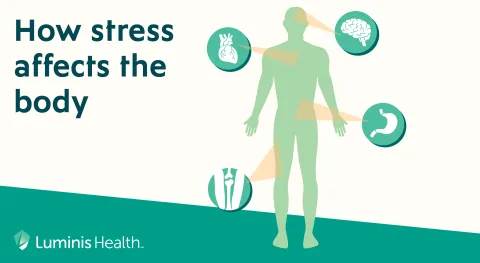Sometimes life gets you down. You may, for example, have trouble at work, paying bills, meeting social obligations or maintaining relationships with friends and family. While experiencing life’s twists and turns, we can all feel blue from time to time. However, if you’ve been feeling overwhelmed for a longer stretch of time, it’s important to find support.
Left untreated, depression can negatively impact your health. However, learning more about mental health disorders — including understanding how to recognize their risk factors and symptoms — can go a long way toward helping you find proper care and getting back to living your best life.
Body, Mind and Spirit Work Together to Help You Feel Your Best
The Greeks were right: A sound mind is a sound body. Mental and physical health are inseparable and equally important to your overall health. When it comes to your mental health, there’s a lot involved, including how your body functions (your biology), how you think (your psychology) and what you do (your habits).
Stress can affect everything from how your white blood cells respond to viral infections and cancer to how your wounds will heal. Long-term depression can increase your risk for chronic conditions like diabetes, heart disease and stroke, weaken your immune system, interfere with your sleep and even wreck your diet. Only when your body, mind and spirit are working at their best, can you truly enjoy life.
Understanding Mental Disorders
Mental disorders are serious conditions that make it even more challenging to cope with the stresses of daily living; affecting your thinking, feelings, moods and behaviors, relationships with others and your ability to function from day to day.
Know the Types
There are many types of behavioral health disorders, including:
- Mood disorders
- Eating disorders
- Panic Anxiety disorders
- Stress disorders
- Psychotic disorders
- Substance use disorders
Recognize the Risk Factors
Although there’s no single cause for behavioral health disorders, risk factors include:
- Chronic stress
- Traumatic experiences
- Chemical imbalances in the brain
- Family history
- Feelings of loneliness or isolation
- Alcohol or drug use
Know When You Need Help
About one in four people have mental health issues that affect their everyday activities. Unfortunately, about 75 percent of them don’t get the help they need. Changes in your behavior or outlook can signal that it’s time to get help from others. If you have trouble managing your symptoms, or they won’t go away, it may be time to talk to a professional.
In addition to feeling overwhelmed, withdrawn or disconnected, symptoms may include:
- Chronic anxiety
- Constant sadness
- Excessive anger
- Extreme mood swings
- Inability to manage problems or daily activities
- Nervousness
- New or increased substance use
- Thoughts of suicide or harming others
You should never feel embarrassed about needing help to feel your best. Just like for any other healthcare concern, you need a healthcare professional to address your mental health. Getting the help you need, sooner rather than later, can help you to get on the path to recovery.
How to Find Mental Health Help
Your primary care doctor can help you find mental health services. You can also get help, including a mental health evaluation, therapy and medication management, from Luminis Health.
Before you meet with a mental health professional, it can help to write down a list of questions to ask. Here are a few examples to get you started:
- Do you have experience caring for others in my situation?
- How do you treat my condition?
- How long can I expect treatment to last?
- What do you charge?
- Do you take insurance?
You may also want to write down a list of the results you want from treatment. Sharing these with your behavioral health specialist can steer you both in the right direction toward meeting your mental health goals.
Call 988 for Immediate Help
If you (or a loved one) are in crisis or thinking about hurting yourself, the National Suicide and Crisis Prevention Lifeline offers immediate help 24 hours a day, 7 days a week in the United States. This is a national network of local crisis centers providing free, confidential emotional support to people in suicidal crisis or emotional distress.
Make Your Mental Health Your Priority
Getting help for behavioral health disorders starts with you. Self-help can be an important first step to your improvement or recovery, and it begins with self-awareness. Once you take the first steps to identify that you’re having trouble in your daily life, you’re on your way to better overall health.




